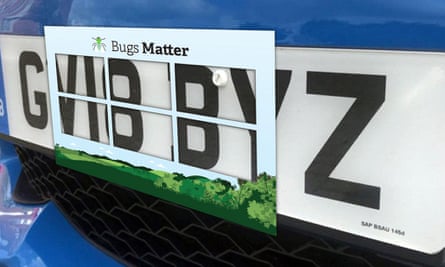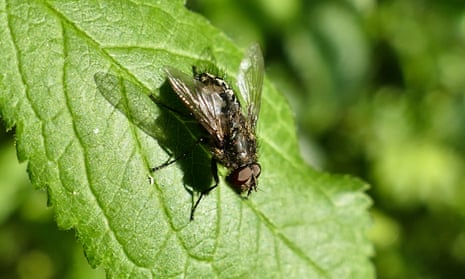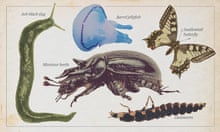The number of flying insects in Great Britain has plunged by almost 60% since 2004, according to a survey that counted splats on car registration plates. The scientists behind the survey said the drop was “terrifying”, as life on Earth depends on insects.
The results from many thousands of journeys by members of the public in the summer of 2021 were compared with results from 2004. The fall was highest in England, at 65%, with Wales recording 55% fewer insects and Scotland 28%.
With only two large surveys so far, the researchers said it was possible that those years were unusually good ones, or bad ones, for insects, potentially skewing the data, and so it was vital to repeat the analysis every year to build up a long-term trend. But the new results are consistent with other assessments of insect decline, including a car windscreen survey in rural Denmark that ran every year from 1997 to 2017 and found an 80% decline in abundance.
Participants in the British survey downloaded an app, Bugs Matter, which enabled them to record their journeys and the number of bugs squashed on their registration plates. The next survey will run from June to August.

“This vital study suggests that the number of flying insects is declining by an average of 34% per decade – this is terrifying,” said Matt Shardlow at Buglife, which ran the survey along with Kent Wildlife Trust (KWT). “We cannot put off action any longer, for the health and wellbeing of future generations this demands a political and a societal response. It is essential that we halt biodiversity decline now.”
Paul Hadaway, at KWT, said: “The results should shock and concern us all. We are seeing declines in insects which reflect the enormous threats and loss of wildlife more broadly across the country. We need action for all our wildlife now by creating more and bigger areas of habitats, providing corridors through the landscape for wildlife and allowing nature space to recover.”
Insects are critical in maintaining a healthy environment, by recycling organic matter, pollination and controlling pests. But scientists behind a recent volume of studies concluded they are undergoing a “frightening” global deterioration that is “tearing apart the tapestry of life”. A global scientific review in 2019 said widespread declines threatened to cause a “catastrophic collapse of nature’s ecosystems”.
The new survey included almost 5,000 journeys made in 2021 and determined the “splat rate” for each, ie the number of insects recorded per mile. Wet days were excluded as rain might have washed some of the splatted insects off the plates.
In the 2004 survey, which was conducted by the RSPB, only 8% of journeys failed to splat any insects at all. But in 2021, 40% of journeys did not record a single squashed bug. The possibility that newer vehicles were more aerodynamic and therefore hit fewer insects was ruled out by the data.
The information gathered by the survey did not address why the decline was significantly lower in Scotland. But Shardlow said the factors known to harm insects, including habitat fragmentation, climate change, pesticides and light pollution, were less intense in Scotland.
As well as demanding action from the government and councils, Buglife said people could help insects by not using pesticides, letting grass grow longer and sowing wildflowers in gardens. If every garden had a small patch for insects, collectively it would probably be the biggest area of wildlife habitat in the world, the group said.










